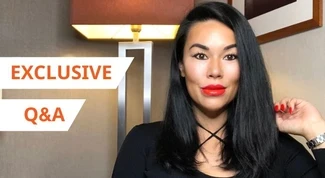In our official Q&A with Jodi-Ann Burey, she unveiled the many microaggressions that women of colour face and what businesses must do to eliminate racism at work. Also reflecting on imposter syndrome, Jodi-Ann answers why we must talk more about the health of underrepresented groups.
Find out more from Jodi-Ann, an inspirational female speaker and diversity and inclusion expert in our exclusive interview below, conducted by Chris Tompkins.
Q: How must business leaders tackle racism at work?
Chris: Over the last couple of years, countless CEOs and business leaders have asked the same thing, how can we better tackle racism?
Jodi-Ann: "There's this concept of issue fluency. We think about Black Lives Matter and the racial reckoning that's happening not just in the United States, but across the world, thinking about the discrimination, racism specifically against Black people.
"A lot of companies that are just donating or making statements about things, but they don't actually know the issues. They don't actually know even how those issues show up, not just in their workplaces, but in the actual work that they do.
"I'll never forget that there was a white coats for Black Lives rally that was happening across the country in the United States, and I'm not sure if they have them in the UK, but this stand against police brutality and thinking about racism as a public health issue and all of that was great... but where were they talking about how racism shows up in the health care system, like, in your actual job in your life? And as someone who has deeply navigated the healthcare system after my cancer diagnosis, racism shows up as soon as the doctor walks in the door.
"I think for businesses, regardless of your industry, you have to know how racism is actually showing up in your day-to-day. Racism is a thing,. I don't know if there's any way to contest that, it is a thing. And so let's be honest about its impact and how we do business and what our business is and how our businesses are impacting our communities and impacting our work.
"What I also see with businesses is that you'll have your value statements, things that you believe in, things that you're committed to, but there is a barrier between the things that you say, that you believe in and how those values are actually impacting the decisions that you make.
"How can you allow your values and your knowledge about discrimination, bias, about racism, to impact how you do business? You can't take a stand of, 'we're committed to diversity, equity and inclusion,' put it on your website, and feel really good about it. But then when you look at the demographics of your company, all the folks of colour have a much slower rate to promotion than your White employees.
"Or you're not paying them equitably. Or with a lot of organisations, you'll see that they do have a lot of folks of colour in their company, but they're pooling at the lower entry, lower paid, less senior levels of the company. How does your value for diversity and inclusion actually help you change that dynamic."
Q: How does imposter syndrome manifest in the workplace?
Chris: What is your understanding of imposter syndrome and what are the warning signs in the workplace?
Jodi-Ann: "Great question. So first, I want to start with the origins of impostor syndrome...
"Imposter syndrome was originally coined as the imposter phenomenon in 1978, and what the researchers were observing was that even though women had all the accolades, all the accomplishments, all the achievements, all of what anyone would determine as success, they were not internalising that sense of success. They still feel like, 'I don't belong here, I'm a fraud, someone's going to find me out. I'm not that smart.' There were examples of women who talk about, 'oh, the only reason I got into this competitive graduate programme was that there was a clerical error.'
"Even though all the evidence is there, you still don't feel it. It's not internalised. I want to actually flip this and talk about, like, how is impostor syndrome triggered in the workplace environment?
"And I think that links to a lot of the microaggressions we talked about. A really great way to ensure that a woman in your workplace doesn't feel successful is to not pay her equitably. A really good way to make them feel like their contributions don't matter, that they're not good enough and that they're dumb, is to interrupt them constantly in meetings.
"If we think about what's happening in the workplace environment, we keep sending these signals to women, especially women of colour: you don't belong here, you're not good enough. We're putting ourselves in rooms where we are the only one or one of the few people there - that's a really great way to make sure that someone feels they don't belong there, is ensuring that they're the only one.
"I have a huge issue with in how our culture talks about Imposter Syndrome. We continue to put the responsibility for the solutions of that on the women themselves. And so for me, as a Black, disabled woman, of all that I have to go through just to survive a work environment, now I have to fix it. I'm the one who has to tell you what's happening to me and give you solutions to address it. And not just for me, but for everyone else who’s like me."
Q: What must business leaders do to create a culture of confidence?
Chris: We know that resilience and determination are required to succeed, but how can business leaders create a culture of confidence to facilitate their employees' growth?
Jodi-Ann: "You can approach this two ways. I think the first way is to shift your mindset around. I personally have been most inspired by managers and leaders in my companies who actually wanted more for my career than I did.
"They were pushing for me to be at a level that I wasn't even imagining for myself and supported me along the way. Put my name in rooms where no one else was elevating me or my work, mentoring me, sponsoring me, lending their social capital to me, which looks like, 'hey, have you heard about Jodi-Ann, you should meet with her.'
"I could imagine how many times there were probably conversations between folks that were like, 'I don't know, Jodi-Ann's on my team and she's just so contrarian.'
"And to have a business leader step in and say, 'I love that every time I see that Jodie-Ann is on one of my project teams, I know that she's going to push us to have the best products. She's going to ask really good questions.' And so how can you advocate for folks?
"How can you elevate their name among your own peers? How can you imagine more for them? And I've always been pushed that way. There are things that I've accomplished in my career that I don't know would have been possible if I didn't see someone who wanted that for me."
Book Jodi-Ann Today!
Contact the Champions Speakers agency to provisionally enquire about Jodi-Ann for your event today. Simply call one of our helpful booking agents on 0207 1010 553 or email us at [email protected] for more information.









